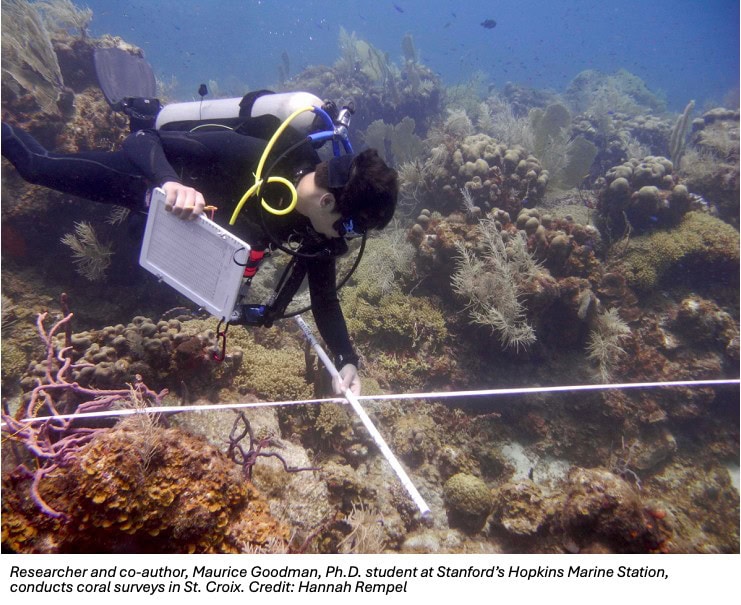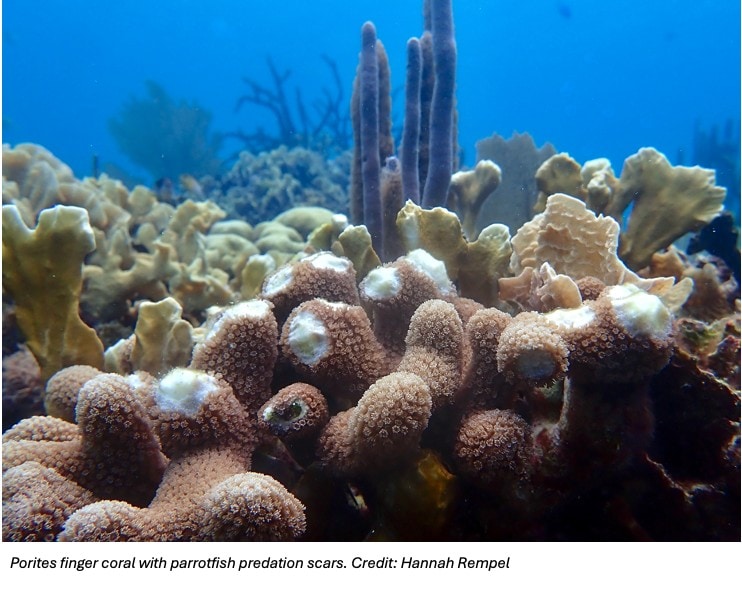Are Parrotfishes Friends or Foes to Coral Reefs?
For many years, parrotfishes have been considered an essential tool for coral reef management as they are known for helping corals grow and survive by grazing on algae and cyanobacteria that can otherwise smother corals. However, some parrotfish species can also eat coral and a new study in Marine Ecology Progress Series released today examined how changes in coral and parrotfish populations across the Greater Caribbean can influence the impact of this dual behavior that can be helpful, yet sometimes detrimental, to coral reefs.

The study, conducted across diverse reef sites in Panamá, Florida, St. Croix, and Bonaire, found that while there was more intense coral predation on reefs with more abundant parrotfishes, there was less predation in areas with lower coral diversity and fewer of their preferred coral prey species. Since parrotfishes generally only prefer a few types of corals, this selective predation suggests that coral diversity and the presence of these specific species influence the intensity of coral predation.
This is important for reef managers since it suggests that parrotfishes may scale back their coral predation intensity on more degraded reefs. They also found that, with the exceptions of a few preferred coral prey, most Caribbean corals are not intensively preyed upon by parrotfishes.
“The findings underscore the importance of considering the dynamic interactions between parrotfishes and coral communities to effectively manage reef resilience under changing conditions. Research suggests that the benefits of parrotfish algae grazing likely outweigh the consequences of their occasional coral predation. However, in the face of widespread decline in coral cover across the Caribbean, it’s important to understand what factors influence the intensity of parrotfish coral predation–especially for frequently targeted coral species.,” said lead author Hannah Rempel, a Ph.D. student at The University of Texas Marine Science Institute in Port Aransas, Texas. Understanding the nuanced impact of parrotfishes on coral reefs can help inform strategies to balance their beneficial algae-grazing activities with their coral predation behavior. By monitoring the specific coral species targeted by parrotfishes, reef managers can better predict and mitigate potential declines in coral diversity.
This study’s insights will play a pivotal role in the ongoing debate about the net impact of parrotfish on coral reef ecosystems. While research suggests that parrotfishes likely have overall net positive impacts on coral reefs, a deeper understanding of their dual roles can facilitate more effective management practices that can enhance coral reef resilience.
Hannah Rempel is joined by coauthors Kelly Bodwin, Peter VanderBloomer, Benjamin Ruttenberg, Tara O’Rourke, Maurice Goodman, Marilla Lippert, Rachael Lamore, Emma Barton at California Polytechnic State University; Deron Burkepile, Thomas Adam at University of California at Santa Barbara; Andrew Altieri at University of Florida; Roxanne-Liana Francisca at Stichting Nationale Parken Bonaire; and Marietta Marroquín at ECOspiral. The research was supported by the NOAA Coral Reef Conservation Program, Smithsonian Tropical Research Institute, California Polytechnic State University Frost Fund, and California State University Council on Ocean Affairs, Science & Technology, Dr. Earl H. Myers & Ethel M. Myers Oceanographic & Marine Biology Trust, Harvard Travellers Club Permanent Fund, and American Museum of Natural History Lerner-Gray Fund for Marine Research.
